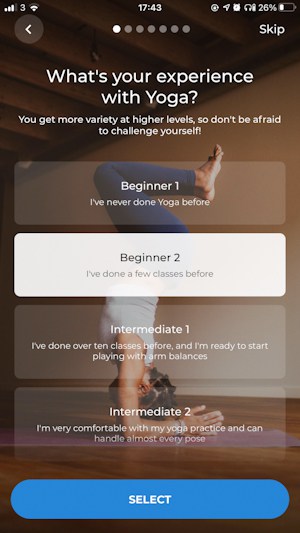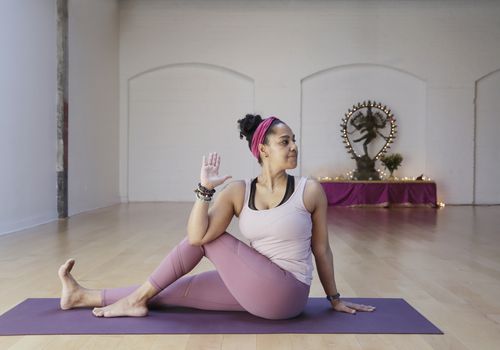
Iyengar Yoga is an accessible, challenging, and rewarding form of yoga that focuses on alignment. Every class has a peak pose. The postures that lead up to it and all subsequent classes are based on this. For example, a king pigeon pose may require balance poses on one leg, hip openings, and backbends. Iyengar classes don’t flow through the poses; instead, they hold them for prolonged periods of times. This allows students the opportunity to align properly and go deeper into each pose.
Pranayama
Iyengar yoga's strong emphasis on posture helps people of all levels. Long, controlled poses help to prevent injuries as well as improve balance and flexibility. For beginners, props are helpful to assist them in developing their poses and avoiding injury. Iyengar yoga offers many benefits. These are just a few:
The first benefit of pranayama is the improvement of concentration. Pranayama in Iyengar yoga involves noticing the quality your breath. A long pause can be uncomfortable. Begin by listening to what your body is doing. Pausing is natural, but they should not last longer than a few seconds. Next, try to focus on breathing through each nostril. This will allow you to have a smooth and steady breath, even under stress or strain.

Props can also be helpful in preventing injury by correcting body alignment. Props such a belt, straps or wooden blocks can all be helpful to ensure that students have the right alignment. Props are a great way to reduce stress and increase range of motion. Props allow you to safely practice more difficult asanas. Props are especially helpful for older students because they can't do some of these asanas with their own hands.
All things align
Iyengar Yoga has a key component: proper alignment. This allows the body to develop in harmony and helps prevent injury or pain. Although alignment is an essential part of any yoga practice it is important to remember that every body is unique and your alignment is also important. Props are an essential part Iyengar Yoga. They allow you and your instructor to keep you in a good posture while allowing you to safely increase the intensity.
Iyengar yoga is more than just a way to relieve back and neck pain. It also improves posture and develops muscles necessary for good posture. Iyengar Yoga can improve your concentration and help you to maintain a better posture. It strengthens the muscles necessary for good posture, such the gluteus maximus. This can also help with postural problems. You will have more energy, confidence and strength by strengthening the muscles involved in your posture.
Accessibility
Props are an important part of Iyengar-style yoga. Props allow you to do the asanas better and save effort. Additionally, Iyengar yoga teachers go through extensive certification. The teachers have a deep understanding of each student's unique needs. They know which poses for different bodies will benefit a student the most.

UCLA Pediatric Pain Program research indicates that Iyengar can help children with chronic and other health issues. The authors of one study describe how the practice improved the physical condition of a 14-year-old girl with chronic pain. The student showed significant functional improvements in the short-term, according to the results. The program had made it easier for the student to eat and stand on her own.
Stress relief
Researchers have looked at the effects of Iyengar yoga for stress relief. The researchers split the women into two different groups according to how stressed they were. One group attended classes twice per week while the other did not. After three months of attending 90-minute yoga classes, the researchers found that both groups had significantly decreased their stress levels. This finding could have implications for stress-management programmes.
Iyengar Yoga is based around the eight limbs that yoga has to offer, as explained by Patanjali through the Yoga Sutras. These limbs are designed to ease stress and give you a better understanding of your body, breath, and mind. Everyone is welcome to try yoga, no matter their level of experience. An instructor can teach 15 students. The instructors have many years of experience in helping people to achieve their goals.
FAQ
What effect does mental health have on my relationships?
Your mental well-being has a direct impact on all aspects of your life. It impacts your ability to function properly at home, school, and work. It can be difficult to build meaningful relationships due to mental health issues.
You may feel isolated when you have a mental condition. You may even avoid social situations because you feel like no one understands you.
It's important to remember, however, that people want to be with you. You only need to teach them how to approach you.
If you are having difficulty connecting with others, talk to them about it. Ask them to help you.
What can psychologists tell us about mental health?
Psychologists believe that mental health is an essential part of human development. They believe mental health does not simply refer to having no mental illness but also being mentally fit.
Different views are held by psychologists about mental health. Some psychologists believe mental health is unnecessary because so many people don't have any mental illnesses. Others believe that mental health and functioning properly are essential.
How does mental health affect our daily lives?
Everyone is affected by mental illness at one time or another. There is one major difference between people with mental illness and those without it: they don't seek out help. Talk to someone if something feels wrong. There are many options for dealing with anxiety, depression, stress, such as medication, therapy, exercise, diet and meditation.
What are some examples for mental-emotional disorders?
Any condition that causes serious distress or impairment of functioning is known as mental disorders. Some examples of mental disorder include anxiety, depression, schizophrenia.
These are 5 ways to improve your mental and/or emotional health.
-
Exercise - It improves brain function and raises energy levels.
-
Sleep - A good way to reduce anxiety and stress is to get enough sleep.
-
Nutrition – Healthy foods like fruits and vegetables can help you stay strong and energized.
-
Meditation – Regular meditation can reduce stress and anxiety.
-
Socialization - Spending time with friends and family, keeps us happy and connected.
What can you do if you are experiencing mental health issues
If you are suffering from any type of mental illness, it is important to seek professional help. Perhaps you've been through trauma or suffered abuse in the past. You might have experienced trauma or abuse in the past.
An eating disorder, addiction, and other mental illnesses could also be a problem. These types of disorders can cause severe damage to your life.
They shouldn't be dealt with on their own. You should speak to someone who understands what you're going through. A professional therapist will be able to provide you with the support and guidance that you need in order to overcome these problems.
Statistics
- It means no drinking any alcoholic beverages and no taking any drugs that aren't 100% natural.
- Similarly, while there is some agreement about the boundaries of typical mental disorders 2, there is likely less agreement about those for positive mental health. (ncbi.nlm.nih.gov)
- More than 40 million adults in the United States have an anxiety disorder, but less than 37% of people seek mental health treatment for their symptoms. (talkspace.com)
- According to the National Alliance of Mental Illness (NAMI), one in five Americans experiences mental health issues which translates to more than 40 million adults a year. (doctorondemand.com)
- Neuropsychiatric diseases are the leading cause of death and disability in the U.S., accounting for 18.7 percent of all years of potential lifespan loss and premature mortality.
External Links
How To
How to handle stress
Stress is normal. However, we need to be able to relax and ease our tension when we feel stressed. Stress can impact every area of your daily life. Stress can cause physical problems, including headaches. You may even develop ulcers if you're under chronic stress.
There are many things you can do to reduce stress. Exercise is a great way to release endorphins. This makes you happy, relaxed, as well as calm. Meditation helps reduce stress by slowing down, and taking deep breathes. Yoga is another great way of reducing stress and improving overall health.
It is important to learn how stress can be controlled and eliminated. Ask someone who knows what to do if you are unsure.